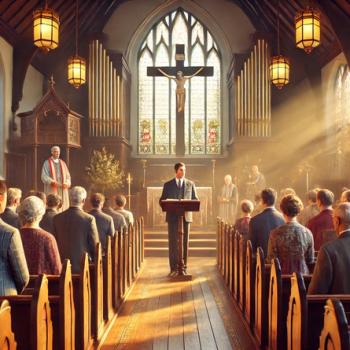To protect ourselves, we have stood in winding lines at airports to be screened in ways designed to prevent the last terrorist method, or the one before that, even.
To protect ourselves, we have agreed that strangers can touch us in places we have told our children should never be touched by strangers, or have agreed that screeners may see us virtually naked so we can feel more sure no one has a bomb in his underpants.
Whether you have approved or disapproved of how we have conducted ourselves in this War on Terror, the upshot is that our personal fears transformed our social and political lives as well as our individual lives. Safety became our highest good. But when we try to build a common life around an overarching desire for security, we settle for what Scott describes as "a minimalist and passive ethic" that seeks only to avoid pain, stay safe, and be careful (Following Jesus in a Culture of Fear, 29).
When our city is in ruins—as in Bruce Springsteen's heart-breaking and beautiful song "My City of Ruins" closing his 9/11 album The Rising—we can be so tempted to hold tight to what we have, to live in fear, that we find it impossible to rise up, as the song's speaker implores. When security is our highest good, we tend to live tiny, frightened lives that keep us from loving fully, giving generously, extending hospitality to the stranger.
When safety is what we seek, we find it impossible even to consider the lesson that Springsteen prays we will learn from the 9/11 first responders on another of the songs from The Rising, "Into the Fire":
May your strength give us strength.
May your faith give us faith.
May your hope give us hope.
May your love give us love.
But, thanks be to God, if embracing the wrong goal has been our way in the past, it does not have to be in the present. We can replace security as our highest good with something more noble, something that more closely resembles the people God has called us to be.
Here's proof: On August 16, 2005, during a service of prayer, Brother Roger, the 90-year-old founder of the Taizé Community in France, was publicly stabbed to death by a deranged woman. Roger was a figure of great hope and light in the Church, a faithful person beloved by Pope Benedict as well as by Protestants around the world, a person who lived with love and who welcomed everyone who sought a deeper knowledge of God.
After the shock of this event, the Taizé Community could have pursued many possible responses, most of which will sound familiar: All worshippers might be scanned or checked for dangerous weapons; the lives and pasts of those hundred thousand plus people who annually visit Taizé might be screened and scrutinized; barriers—actual or metaphorical—could be erected to protect the brothers from the public.
But although horrific violence took place in plain sight of all of the members of the Taizé Community (without minimizing the 9/11 tragedy, how many Americans directly witnessed the events in DC or NYC or lost someone we knew personally?), the brothers of Taizé did not choose to make security their highest good.
To put up walls, to create barriers, to exclude, to fail to offer hospitality even when hospitality might potentially expose the community to some risk—these actions, they believed, would destroy the Taizé Community. These possible responses stood directly in opposition to their mission to be a reconciling people calling the world to direct experience of the Most High God.
When I look at these two responses to a violent world—fear, contraction, preemption, anxiety, or hope, love, joy, possibility—I know full well which I want to choose. I am trying to make knowledge of and friendship with God my highest value.
Sometimes—often, in fact—I fail. But I will get up tomorrow morning and, like Springsteen in "My City of Ruins," I will pray for the strength, love, and faith to rise up and embrace my better nature.
Next week, we'll explore the language of rights and natural law from which we derive our American understandings of freedom. Until then, may God give you the grace to risk something big for something good, and may hope, love, joy, and possibility run wild in your life and the lives of those in your communities.





